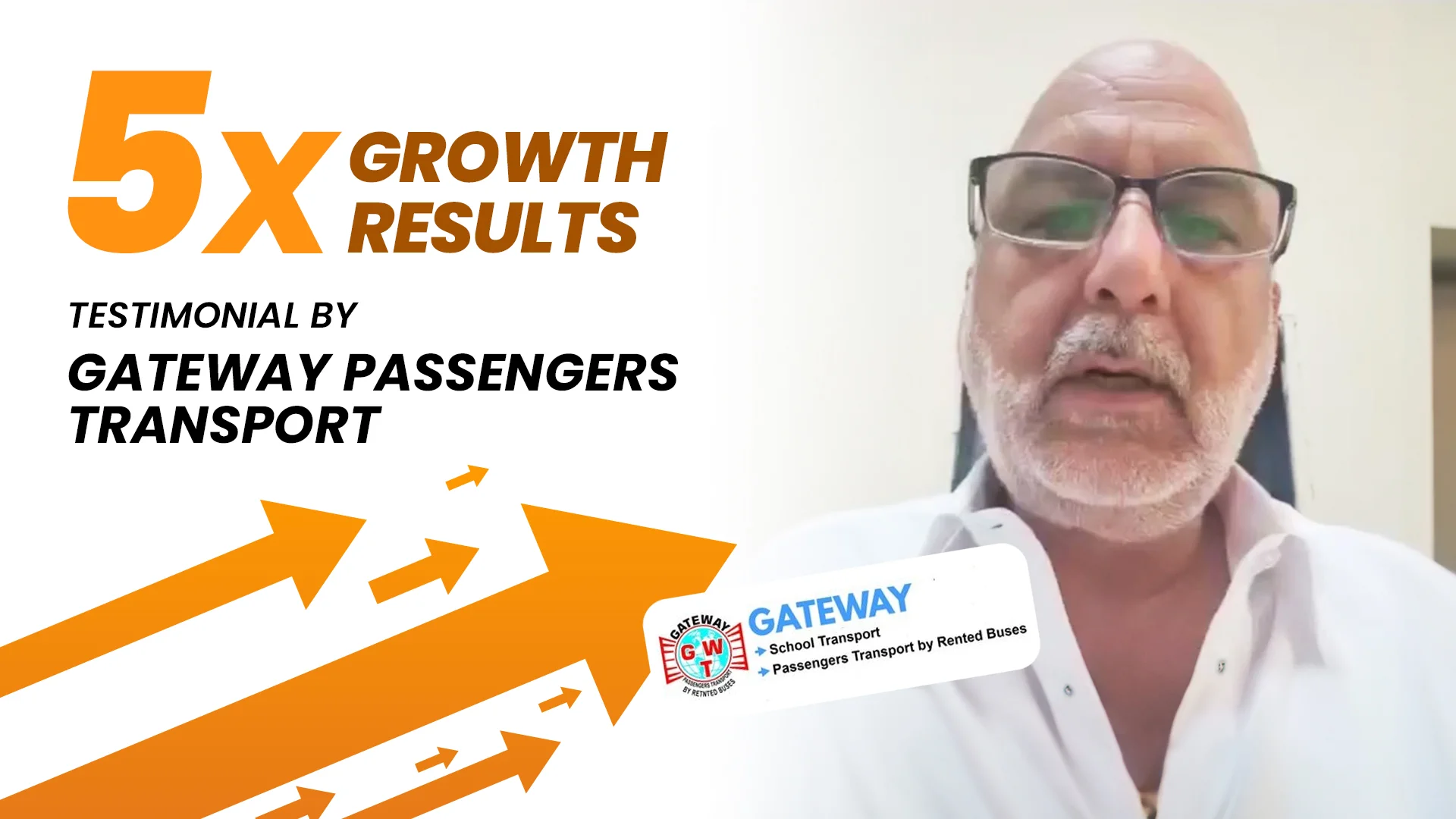Rank Higher. Get Found Faster. Grow Smarter.
Comprehensive Search Engine Optimisation Solutions Built for Your Profit
Partner with SySpree to dominate Google and Bing rankings—Get Started Today

What's your thought?

Awesome! 5X begins here!
Please enter your details

"That’s disappointing, but understood."
Feel free to reach out when you're ready to grow.
Trusted by 1,000+ Brands as their preferred Digital Marketing agency in Mumbai. Chosen for One Reason: Results.










Struggling to Stand Out in Search Results?
Why Most Businesses Fail to Achieve High Rankings
Today, ranking high on Google or Bing is non-negotiable for business growth. Yet, many businesses face challenges like low search visibility, irrelevant traffic, and rising costs from over-reliance on paid ads. Without a sound SEO strategy, these issues persist:
- Poor Rankings: Your website is invisible to potential customers.
- Irrelevant Traffic: Visitors aren’t converting into leads or sales.
- Missed Local Searches: Customers in your area can’t find you.
- Falling Behind Competitors: Rivals who invest in SEO dominate search results.
At SySpree, we eliminate these roadblocks with tailored SEO solutions that focus on delivering measurable results.
The Challenges Businesses Face Without SEO
Low Online Visibility
Your competitors outrank you for critical search terms.
Unoptimized Local Presence
Your business isn’t found in local searches.
Technical Issues
Slow website speed and poor mobile usability hurt rankings.
Weak Backlink Profile
Lack of high-authority backlinks impacts trustworthiness.
Transform Your Website into a Traffic-Generating Powerhouse
Data-Driven SEO Solutions That Deliver Real Growth
Our SEO services are powered by our unique CORE Framework—Consult, Optimize, Reinforce, and Excel. This approach ensures your website ranks higher, attracts quality traffic, and converts visitors into customers.

Consult
We analyze your goals, industry, and competitors to craft a custom SEO plan.

Optimize
From on-page content to technical SEO, we fine-tune your site for better performance.

Reinforce
Build authority with high-quality backlinks and ongoing content strategies.

Excel
Continuously monitor, analyze, and refine for sustained top rankings.

Consult
We analyze your goals, industry, and competitors to craft a custom SEO plan.

Optimize
From on-page content to technical SEO, we fine-tune your site for better performance.

Reinforce
Build authority with high-quality backlinks and ongoing content strategies.

Excel
Continuously monitor, analyze, and refine for sustained top rankings.

Optimize
From on-page content to technical SEO, we fine-tune your site for better performance.

Consult
We analyze your goals, industry, and competitors to craft a custom SEO plan.

Reinforce
Build authority with high-quality backlinks and ongoing content strategies.

Excel
Continuously monitor, analyze, and refine for sustained top rankings.
Testimonials
What Our Clients Achieved with Us





Our Capabilities
Comprehensive Search Engine Optimisation Services
Explore Other Services
Websites That Deliver Real Results
Success Stories That Inspire Confidence
From doubling conversions to reducing bounce rates, Syspree’s websites consistently deliver results. Check out our case studies for in-depth stories of businesses like yours achieving success.
Tailored Designs for Your Unique Needs
Solutions for Every Industry
Our Global Presence
Countries We are Present In

Fueling Growth Through Data Excellence
Proven Success in Numbers
OUR LEADERSHIP


Our leadership ensures Syspree delivers innovation and measurable results through expert website design and development strategies.
OUR TEAM























Our skilled team combines creativity with precision, building websites that deliver exceptional user experiences and business results
CASE STUDIES
Proven Results Across Industries
Explore how Syspree has helped businesses across industries achieve measurable growth with tailored digital marketing and web development strategies. From e-commerce to tech startups, our custom solutions deliver proven results that drive revenue, improve customer acquisition, and enhance brand visibility

CASE STUDIES
30 Times Surge in Leads within a year
Sports Coaching Company

CASE STUDIES
Astounding 800% Increase in FMCG Distributor’s Web Traffic in Just 13 Months!
FMCG Distributors

CASE STUDIES
500% Traffic boost in only 6 months
DECKING AND PATIO COMPANY

CASE STUDIES
Improve Your Traffic by 1400% In Just 2 months!
Immigration Company

CASE STUDIES
900% Traffic Surge in Just 1.5 Years
Holistic Lifestyle
e-commerce

CASE STUDIES
Double Leads for Accounting company in just 2 months
Accountants and corporate services
OUR EXPERTISE, YOUR KNOWLEDGE
Blogs, Podcasts,Vlogs

Proven SEO Strategies to Achieve Top Rankings on Google and Bing
We spread the KNOWLEDGE
Blogs, Podcasts,Vlogs
- All Posts
- : SaaS Web Design Strategy
- Abu Dhabi
- Adelaide
- Africa
- Ahmedabad
- AI & Innovation
- AI & Personalization
- AI & SaaS Personalization
- AI & Workforce Strategy
- AI Automation
- AI in E-commerce
- AI in SaaS Marketing
- AI in Technology
- AI in Technology Business
- AI Innovation in E-commerce
- AI Marketing
- AI Strategy
- AI Strategy in E-commerce
- AI Success Stories
- AI Success Stories in E-commerce
- AI vs Human Strategy
- Ajman
- Analytics & CRO
- Artificial Intelligence
- Bahrain
- Belgium
- Bengaluru
- Birmingham
- Blogs
- Branding and Marketing Services blog
- Brazil
- Business Growth
- Canada
- Canberra
- chennai
- Chicago
- Consulting
- Consulting Business Growth
- Consulting Growth Stories
- Consulting Lead Generation
- Consulting Marketing
- Consulting Strategy
- Content Marketing
- Corporate Services
- Corporate Services Growth
- Custom Software
- Customer Support
- Cyber Security
- Data Management
- data privacy compliance
- Data Protection
- data protection strategies
- data security solutions
- Decking Business Digital Marketing
- Delhi
- Digital FnB Marketing
- Digital Marketing
- Digital marketing for Tech
- Digital Tourism Marketing
- E-commerce Consumer Behavior
- E-commerce Conversion Optimization
- E-commerce Digital Marketing
- E-commerce Growth Stories
- E-commerce IT Best Practices
- E-commerce IT Infrastructure
- E-commerce IT Security
- E-commerce IT Strategy
- E-commerce IT Success Stories
- E-commerce Lead Generation
- E-commerce Marketing
- E-commerce Marketing Analytics
- E-commerce Marketing Strategy
- E-commerce Marketing Success Stories
- E-commerce Outsourcing
- E-commerce Outsourcing Analysis
- E-commerce Outsourcing Risks
- E-commerce Outsourcing Strategy
- E-commerce Outsourcing Success Stories
- E-commerce Outsourcing Trends
- E-commerce SEO
- E-commerce Social Media Marketing
- E-commerce Success Stories
- E-commerce UX/UI
- E-commerce Web Design
- E-commerce Web Design Strategy
- E-commerce Web Design Trends
- Ecommerce
- Edinburgh
- Education
- Education Analytics
- Education Business Growth
- Education Business Models
- Education Growth Stories
- Education Growth Strategies
- Education Lead Generation
- Education Marketing
- Education Strategy
- FnB Brand Strategy
- FnB Business Growth
- FnB Business Models
- FnB Industry Trends
- FnB Lead Generation
- FnB Marketing Analysis
- FnB Performance Metrics
- FnB Sales Channels
- FnB Success Stories
- France
- Fujairah
- Future of AI
- Future of AI in E-commerce
- Future of E-commerce IT
- Future of E-commerce Marketing
- Future of E-commerce Outsourcing
- Future of Education
- Future of FnB
- Future of Healthcare
- Future of Hospitality
- Future of Interior Design
- Future of Renovation
- Future of SaaS
- Future of SaaS Marketing
- Future of SaaS Web Design
- Future of Tech Business
- Future of Technology IT
- Future of Technology Marketing
- Future of Technology Outsourcing
- Future of Technology Web Design
- Future of Tourism
- Future of Travel Industry
- Ghana
- Goa
- Google Ads
- Graphic designing
- Guides
- Healthcare
- Healthcare Analytics
- Healthcare Business Growth
- Healthcare Business Models
- Healthcare Growth Stories
- Healthcare Growth Strategies
- Healthcare Lead Generation
- Healthcare Marketing
- Healthcare Strategy
- HongKong
- Hospitality Brand Management
- Hospitality Business Growth
- Hospitality Business Models
- Hospitality Consumer Behavior
- Hospitality Distribution Strategy
- Hospitality Expansion Stories
- Hospitality Industry Trends
- Hospitality Lead Generation
- Hospitality Performance Metrics
- Hospitality Pricing Strategy
- Hospitality Success Stories
- Hyderabad
- Information Technology
- Interior Design Growth Stories
- Interior Design Lead Generation
- Interior Design Marketing
- Interior Design Strategy
- Interior Design Trends
- Ireland
- IT Services
- Job Post
- Kenya
- Lead Generation for Tech
- Lead Generation for Training Companies
- Leeds
- Logo Designing services blog
- London
- Los Angeles
- Malaysia
- Marketing and Sales
- Marketing Strategy for Tech
- Marketing Technology
- Melbourne
- Miamai
- Miami
- Middle East
- Mumbai
- Nepal
- Netherland
- New York
- New Zealand
- Oman
- Others
- Outsourcing
- Paid advertising
- Pay Per Click
- Perth
- Philippines
- Podcasts
- Portugal
- Pune
- Qatar
- Ras-Al-Khaimah
- Renovation Business Growth
- Renovation Growth Stories
- Renovation Lead Generation
- Renovation Marketing
- Renovation Strategy
- Renovation Trends
- Roundup
- SaaS
- SaaS AI Strategy
- SaaS AI Success Stories
- SaaS Business Growth
- SaaS Conversion Optimization
- SaaS Digital Marketing
- SaaS Growth Stories
- SaaS Growth Strategies
- SaaS Lead Generation
- SaaS Marketing Analytics
- SaaS Marketing Strategy
- SaaS Marketing Success Stories
- SaaS Marketing Trends
- SaaS Metrics and Analytics
- SaaS Pricing Strategy
- SaaS SEO
- SaaS Strategy
- SaaS Success Stories
- SaaS Trends
- SaaS UX/UI
- SaaS Web Design
- SaaS Web Design Trends
- Scaling & Expansion in Training Businesses
- SEO
- SEO & Search Marketing
- SEO Strategies
- Sharjah
- social media marketing
- Social Media Marketing
- Spain
- Sri-Lanka
- Surat
- Switzerland
- Sydney
- Syria
- SySpree
- Tanzania
- Tech Business Growth
- Tech Business Models
- Tech Growth Frameworks
- Tech Growth Stories
- Tech Growth Strategy
- Tech lead Generation
- Tech Strategy & Innovation
- Technology
- Technology Digital Marketing
- Technology IT Best Practices
- Technology IT Infrastructure
- Technology IT Risk Management
- Technology IT Security
- Technology IT Strategy
- Technology IT Success Stories
- Technology IT Trends
- Technology Marketing Analytics
- Technology Marketing Strategy
- Technology Marketing Success Stories
- Technology Marketing Trends
- Technology Outsourcing
- Technology Outsourcing Analysis
- Technology Outsourcing Models
- Technology Outsourcing Risks
- Technology Outsourcing Strategy
- Technology Outsourcing Success Stories
- Technology Outsourcing Trends
- Technology SEO
- Technology Success Stories
- Technology UX/UI
- Technology Web Design
- Technology Web Design Strategy
- Technology Web Design Trends
- Thailand
- Tourism Business Growth
- Tourism Business Models
- Tourism Industry Insights
- Tourism Industry Trends
- Tourism Lead Generation
- Tourism Marketing Analysis
- Tourism Marketing Channels
- Tourism Pricing Strategy
- Tourism Success Stories
- Training Business Models & Industry Evolution
- Training Growth Stories
- Training Lead Generation
- Training Marketing
- Travel Analytics
- Travel Business Growth
- Travel Business Trends
- Travel Growth Stories
- Travel Lead Generation
- Travel Marketing
- Travel Marketing & Distribution
- Travel Strategy
- UAE
- UI/UX Design
- Vlogs
- Web Design
- Web Develipment
- Web Development
- White Label
Let’s Get Your Business Ranking Higher Today
Contact us today to schedule a consultation. Discover how Syspree can transform your digital presence and help your business thrive.
FAQ
Your AI Marketing Questions Answered
Search Engine Optimisation (SEO) is the process of improving a website’s visibility on search engine results pages (SERPs) like Google, Bing, and Yahoo. The ultimate goal is to attract organic (non-paid) traffic by ensuring your website ranks higher for relevant keywords and phrases. When done correctly, SEO helps your business connect with its target audience at the right time—when they’re actively searching for products or services you offer.
Why is SEO Important for Businesses?
SEO is a crucial component of digital marketing, providing several benefits that contribute to business growth and profitability:
- Enhanced Online Visibility:
The first page of search results gets more than 90% of clicks, with the top three results capturing the majority. If your website isn’t ranking high, you’re missing out on valuable traffic. - Cost-Effective Marketing:
Unlike paid advertising, SEO drives long-term traffic without ongoing costs per click. While it requires an initial investment, the returns grow exponentially over time. - Quality Traffic:
SEO targets users who are already searching for what you offer. This means the traffic you receive is highly relevant and more likely to convert into leads or sales. - Building Credibility:
Websites that rank high on SERPs are perceived as more credible and trustworthy by users. SEO focuses on improving the quality of your content, site structure, and backlinks, which enhances your authority. - Local Reach for Small Businesses:
Local SEO ensures your business appears in location-based searches, such as “coffee shop near me” or “best SEO agency in Singapore.” This is especially beneficial for brick-and-mortar businesses aiming to attract nearby customers.
How SEO Works: A Brief Overview
SEO involves optimizing various aspects of your website to align with search engine algorithms. Here’s a simplified breakdown:
- Keyword Research:
Identifying the words and phrases your target audience uses to search for products or services. For example, if you run an SEO agency, keywords like “Search Engine Optimisation services” and “SEO agency for small businesses” are relevant. - On-Page SEO:
Optimizing individual web pages to rank higher. This includes improving title tags, meta descriptions, header tags, and content. - Technical SEO:
Ensuring your website’s backend is in good shape, including fast loading times, mobile responsiveness, and a clear site structure. These factors improve user experience and make it easier for search engines to crawl your site. - Off-Page SEO:
Building high-quality backlinks from reputable websites. These links act as “votes of confidence” for your site’s authority. - Local SEO:
Focusing on location-specific strategies to appear in local searches. This includes managing your Google My Business profile, gathering reviews, and optimizing for local keywords. - Content Marketing:
Creating high-quality, relevant content that answers your audience’s questions and keeps them engaged. Blogs, videos, and infographics are all effective forms of content marketing.
The Business Impact of SEO
SEO directly impacts your business’s ability to grow in a competitive digital landscape. Let’s explore its benefits in more detail:
- Increased Traffic and Leads:
By appearing at the top of search results, you capture more clicks and attract potential customers actively searching for your offerings. - Higher Conversion Rates:
Organic traffic from SEO tends to convert better than traffic from other channels. This is because users visiting your site through search are already interested in your services. - Better User Experience (UX):
SEO isn’t just about rankings—it’s also about creating a seamless experience for visitors. From fast-loading pages to mobile-friendly designs, SEO improves overall usability. - Competing with Larger Brands:
Even small businesses can compete with larger corporations by targeting niche keywords and optimizing for local searches. - Sustainable Growth:
While paid ads stop delivering results as soon as you stop funding them, SEO builds a foundation for consistent traffic and growth over time.
Why SEO is a Long-Term Strategy
SEO takes time to produce results because search engines need to crawl and index your website, assess its quality, and compare it to competitors. However, once your site gains authority and ranks high, it becomes a sustainable source of traffic and leads.
Key milestones in an SEO journey include:
- Months 1-3: Keyword research, technical fixes, and initial content creation.
- Months 4-6: Improvement in rankings for long-tail keywords and increased traffic.
- Months 6-12: Higher rankings for competitive keywords and measurable ROI.
Why Choose SySpree for SEO?
At SySpree, we specialize in providing tailored SEO solutions that drive measurable results. Here’s how we help businesses succeed:
- Customized Strategies:
We craft a unique plan based on your business goals, target audience, and competitive landscape. - Proven Expertise:
Our team stays updated with the latest algorithm changes to ensure your site remains competitive. - Comprehensive Services:
From local SEO to link building and content marketing, we offer end-to-end SEO solutions. - Transparent Reporting:
You’ll receive regular updates on your site’s performance, including traffic, rankings, and conversions.
In Conclusion
Search Engine Optimisation is more than just a marketing tool—it’s a business necessity. It helps you connect with your audience, build credibility, and achieve long-term growth. Whether you’re a small business looking to dominate local searches or a global brand aiming for competitive rankings, SEO is your gateway to success.
With SySpree’s expertise, you can unlock the full potential of SEO and stay ahead in the digital race.
Search Engine Optimisation (SEO) is a long-term investment that yields sustainable results over time. Unlike paid ads, which can generate immediate traffic, SEO focuses on building organic visibility and authority, which naturally takes longer to materialize. Typically, businesses can expect to see noticeable improvements in 3 to 6 months, though this timeline depends on various factors.
Factors Influencing SEO Timelines
- Website’s Current Status:
If your website is new or has minimal optimization, it will take longer to rank higher on search engines. Websites with strong foundations (e.g., a clean technical structure and existing content) may see faster results. - Competition Level:
Industries with high competition (e.g., e-commerce, real estate, or technology) require more effort and time to outrank established players. Conversely, businesses in niche markets may experience quicker improvements. - Keyword Difficulty:
Targeting high-volume, competitive keywords takes more time than focusing on long-tail keywords (e.g., “affordable SEO services for startups”). Starting with less competitive terms can help achieve quicker wins while building authority for broader keywords. - Search Engine Algorithms:
Google and Bing continuously update their algorithms, which can impact how quickly improvements are reflected. Staying updated with algorithm changes ensures consistent progress. - SEO Strategy and Execution:
The quality, consistency, and depth of your SEO strategy play a critical role. A comprehensive approach that includes keyword research, technical fixes, content marketing, and link building yields better results over time.
Typical SEO Timeline: What to Expect
Month 1: Research and Planning
- Conducting keyword research to identify target phrases.
- Performing a detailed website audit to uncover technical issues.
- Developing a tailored SEO strategy based on your goals and industry.
- Fixing immediate technical issues, such as crawl errors or broken links.
Result: Minimal impact on rankings as foundational work begins.
Months 2-3: Implementation and Content Optimization
- Optimizing on-page elements like meta tags, headings, and internal links.
- Creating and publishing high-quality content targeting relevant keywords.
- Enhancing site structure and user experience to align with search engine preferences.
Result: Gradual improvement in keyword rankings and a small uptick in organic traffic.
Months 4-6: Authority Building and Analytics
- Building high-quality backlinks to improve domain authority.
- Monitoring site performance and refining strategies based on data insights.
- Expanding keyword targeting to include more competitive terms.
Result: Significant improvements in organic traffic and rankings for primary keywords.
Months 6-12: Sustained Growth and Refinement
- Scaling content efforts by targeting broader topics.
- Continuing link-building campaigns to strengthen authority.
- Keeping up with algorithm updates and making necessary adjustments.
Result: Top rankings for competitive keywords, leading to steady traffic growth and conversions.
Why Does SEO Take Time?
- Indexing and Crawling:
Search engines need time to discover, crawl, and index new or updated content on your website. This process can take days or even weeks depending on the site structure and crawl frequency. - Building Authority:
Establishing your website as a trustworthy source requires consistent effort. High-quality backlinks, regular content updates, and positive user engagement contribute to long-term credibility. - Competitor Activity:
SEO is a dynamic field where competitors are continuously optimizing their websites. Achieving and maintaining top rankings requires ongoing effort to stay ahead. - Algorithmic Delays:
Search engines evaluate numerous factors before adjusting rankings, including user behavior, click-through rates, and bounce rates. These changes take time to reflect in SERPs.
Why Patience is Key in SEO
SEO is often compared to a marathon, not a sprint. While it may feel slow initially, the long-term benefits far outweigh the wait. Here’s why patience pays off:
- Sustainable Results:
Once your site achieves high rankings, it becomes a consistent source of traffic without additional costs per click. Unlike paid ads, which stop delivering results when funding ends, SEO builds lasting visibility. - Compounding Returns:
Every improvement compounds over time. For example, a well-optimized blog post can continue driving traffic and leads years after publication. - Enhanced Brand Authority:
Regularly appearing in search results reinforces your brand’s credibility, making users more likely to trust and choose your business.
How SySpree Accelerates SEO Results
While no agency can guarantee instant results, SySpree focuses on implementing efficient and proven strategies to maximize outcomes within a realistic timeframe. Here’s how we fast-track your success:
- Quick Wins with Long-Tail Keywords:
By targeting less competitive, high-intent keywords, we help you gain traction while building authority for broader terms. - Data-Driven Approach:
Using advanced analytics tools, we continuously monitor performance and refine strategies to ensure steady progress. - Comprehensive Services:
From technical SEO to content marketing and local SEO, we cover all aspects to deliver holistic results. - Proactive Adjustments:
We stay ahead of algorithm changes, ensuring your site remains compliant and competitive.
When to Expect Results with SySpree?
- Month 3: You’ll start seeing improvements in traffic and rankings for targeted keywords.
- Months 4-6: Significant growth in organic visibility, leading to more inquiries or sales.
- Months 6-12: Strong domain authority and top rankings for competitive keywords.
Our tailored approach ensures your business not only achieves high rankings but also sustains them over the long term.
In Conclusion
While SEO requires time and consistent effort, the results are worth the wait. It’s a sustainable, cost-effective strategy that drives organic traffic, builds credibility, and supports long-term business growth. With SySpree’s expertise, you can rest assured that your SEO journey is in capable hands, delivering measurable results at every stage.
A successful Search Engine Optimisation (SEO) strategy involves multiple interconnected components that work together to improve a website’s visibility, drive organic traffic, and ultimately convert visitors into customers. Each aspect of an SEO strategy must align with the ever-evolving algorithms of search engines like Google and Bing. Let’s break down the key elements of an effective SEO plan:
1. Comprehensive Keyword Research
Why It’s Important:
Keyword research forms the foundation of any SEO strategy. By identifying the terms your target audience is searching for, you can optimize your website to appear in front of potential customers at the right time.
Best Practices:
- Use tools like Google Keyword Planner, SEMrush, or Ahrefs to find keywords with high search volume and low competition.
- Focus on long-tail keywords (e.g., “affordable SEO agency for small businesses”) to attract highly targeted traffic.
- Incorporate semantic keywords and phrases to ensure your content aligns with user intent.
2. On-Page Optimisation
Why It’s Important:
On-page SEO ensures that individual pages on your website are optimized for both search engines and users. This directly impacts how well your site ranks for targeted keywords.
Key Components of On-Page SEO:
- Title Tags: Include primary keywords in your title tags and ensure they are compelling to users.
- Meta Descriptions: Write concise, keyword-rich descriptions that encourage users to click.
- Header Tags (H1, H2, H3): Use headers to structure content and incorporate keywords naturally.
- Content Quality: Create in-depth, original, and engaging content that satisfies user queries.
- Internal Linking: Link to other relevant pages within your website to improve navigation and distribute link equity.
3. Technical SEO
Why It’s Important:
Technical SEO focuses on the backend aspects of your website to ensure search engines can crawl, index, and rank your site effectively. A well-optimized technical structure improves usability and search performance.
Key Elements of Technical SEO:
- Mobile-Friendliness: Ensure your website is responsive and functions seamlessly on all devices.
- Site Speed: Optimize images, enable caching, and use a content delivery network (CDN) to reduce page load times.
- Secure Website (HTTPS): Use SSL certificates to build trust with both users and search engines.
- Structured Data Markup: Implement schema markup to provide search engines with additional context about your content.
- XML Sitemap: Submit a sitemap to search engines to improve crawlability.
4. High-Quality Content Creation
Why It’s Important:
Content is at the heart of SEO. It not only helps you rank for keywords but also keeps users engaged and encourages them to take action. Search engines prioritize websites that consistently produce valuable, user-centric content.
Best Practices:
- Create blogs, guides, and infographics that answer common questions or solve problems for your audience.
- Incorporate keywords naturally, focusing on relevance and readability.
- Regularly update old content to keep it fresh and aligned with search intent.
- Use visuals like images and videos to enhance engagement.
5. Link Building (Off-Page SEO)
Why It’s Important:
Backlinks from authoritative websites signal trust and credibility to search engines. A strong backlink profile is one of the most significant ranking factors.
Effective Link-Building Strategies:
- Publish high-quality content that naturally earns backlinks.
- Reach out to industry blogs and websites for guest posting opportunities.
- Build relationships with influencers and thought leaders to expand your reach.
- Avoid black-hat tactics like buying links or participating in link farms, as these can lead to penalties.
6. Local SEO
Why It’s Important:
For businesses targeting a specific geographic area, local SEO ensures you show up in local searches and Google Maps. This is essential for driving foot traffic and local leads.
Key Components of Local SEO:
- Google My Business (GMB): Optimize your GMB profile with accurate business details, images, and regular updates.
- NAP Consistency: Ensure your Name, Address, and Phone Number are consistent across all platforms.
- Local Keywords: Target location-specific terms like “best SEO agency in Singapore.”
- Customer Reviews: Encourage satisfied customers to leave positive reviews on platforms like Google and Yelp.
7. User Experience (UX) and Core Web Vitals
Why It’s Important:
Google’s Core Web Vitals measure critical aspects of user experience, such as load time, interactivity, and visual stability. A seamless UX improves both rankings and user retention.
Best Practices:
- Simplify website navigation for easy access to important pages.
- Optimize for fast-loading pages to reduce bounce rates.
- Ensure a visually appealing design that aligns with your brand.
8. Analytics and Continuous Monitoring
Why It’s Important:
SEO is an ongoing process that requires regular tracking and adjustments. Analytics help you measure the effectiveness of your strategy and identify areas for improvement.
What to Monitor:
- Keyword rankings and changes over time.
- Traffic sources and user behavior metrics.
- Conversion rates and ROI from SEO efforts.
- Bounce rates and dwell time to assess user engagement.
Tools to Use:
- Google Analytics and Google Search Console for performance tracking.
- Ahrefs, SEMrush, or Moz for detailed insights into rankings and backlinks.
9. Adapting to Algorithm Updates
Why It’s Important:
Search engines frequently update their algorithms, which can impact your rankings. Staying proactive ensures your strategy remains effective.
How to Adapt:
- Follow announcements on platforms like Google’s Search Central Blog.
- Partner with an SEO agency like SySpree to stay ahead of changes.
- Focus on evergreen practices like high-quality content and user experience to weather algorithm shifts.
How SySpree Implements These Components
At SySpree, we integrate all these components into a cohesive and customized strategy tailored to your business. Here’s why our approach is effective:
- Tailored Plans: We craft SEO strategies based on your goals, industry, and audience.
- Cutting-Edge Tools: From keyword research to analytics, we use advanced tools to drive results.
- Ongoing Support: SEO doesn’t stop with implementation. We continuously refine strategies to ensure sustained growth.
- Proven Results: Our clients experience significant improvements in traffic, rankings, and conversions.
In Conclusion
A successful SEO strategy is a combination of technical expertise, content creation, and strategic outreach. By addressing each of these components effectively, businesses can achieve higher rankings, attract qualified traffic, and grow sustainably. With SySpree as your SEO partner, you’ll have a tailored, result-driven plan that delivers measurable success.
Search Engine Optimisation (SEO) is one of the most effective ways to drive organic traffic and boost online visibility. However, even small mistakes can undermine your efforts, resulting in wasted time, money, and lost opportunities. Avoiding these common SEO pitfalls is crucial to achieving and sustaining success.
1. Neglecting Keyword Research
Why It’s a Mistake:
Targeting the wrong keywords—or skipping keyword research altogether—leads to irrelevant traffic or none at all. Without understanding what your audience is searching for, your content may not align with their needs.
How to Avoid It:
- Conduct thorough keyword research using tools like Google Keyword Planner, SEMrush, or Ahrefs.
- Focus on a mix of high-traffic and low-competition keywords.
- Include long-tail keywords (e.g., “affordable SEO agency in Singapore”) to capture more specific user intent.
2. Keyword Stuffing
Why It’s a Mistake:
Overloading your content with keywords can make it appear unnatural and spammy. Search engines penalize this practice, and users may be turned off by poor readability.
How to Avoid It:
- Use keywords naturally within the context of your content.
- Focus on semantic keywords and related phrases to diversify your optimization.
- Prioritize content quality over keyword density.
3. Ignoring Technical SEO
Why It’s a Mistake:
Technical issues like slow page speed, broken links, or poor mobile usability can hinder search engine crawling and negatively impact user experience.
How to Avoid It:
- Regularly audit your website using tools like Google Search Console or Screaming Frog.
- Optimize page speed by compressing images, enabling caching, and using a Content Delivery Network (CDN).
- Ensure your site is mobile-friendly and meets Core Web Vitals standards.
4. Publishing Low-Quality Content
Why It’s a Mistake:
Content that is thin, plagiarized, or irrelevant won’t rank well and won’t engage users. Search engines prioritize high-quality, user-focused content that provides value.
How to Avoid It:
- Create original, in-depth, and engaging content tailored to your target audience.
- Address user pain points and answer common questions.
- Regularly update outdated content to keep it relevant.
5. Overlooking Local SEO
Why It’s a Mistake:
If your business targets a local audience, failing to optimize for local search can mean missing out on customers ready to take action nearby.
How to Avoid It:
- Optimize your Google My Business (GMB) profile with accurate information, images, and customer reviews.
- Include local keywords in your content and metadata.
- Ensure your Name, Address, and Phone Number (NAP) are consistent across directories.
6. Not Building Quality Backlinks
Why It’s a Mistake:
Backlinks are one of the most important ranking factors. A lack of high-quality backlinks—or relying on low-quality, spammy links—can hurt your credibility.
How to Avoid It:
- Focus on earning backlinks from authoritative and relevant websites.
- Avoid purchasing backlinks or participating in link schemes.
- Publish shareable content like case studies, infographics, or expert guides to attract natural links.
7. Ignoring User Experience (UX)
Why It’s a Mistake:
Search engines prioritize websites that offer a seamless and enjoyable user experience. Poor navigation, slow loading times, and cluttered designs can drive users away.
How to Avoid It:
- Simplify your site’s navigation for easy access to important pages.
- Use clear call-to-actions (CTAs) to guide users.
- Optimize for fast-loading pages and responsive designs.
8. Focusing Only on Rankings
Why It’s a Mistake:
While high rankings are important, they aren’t the ultimate goal. Traffic and conversions matter more than just appearing on the first page.
How to Avoid It:
- Optimize for user intent to attract visitors who are more likely to convert.
- Track key performance indicators (KPIs) like traffic, bounce rate, and conversion rates to measure success.
- Align your SEO strategy with broader business goals.
9. Ignoring Analytics and Data
Why It’s a Mistake:
Without monitoring your site’s performance, you won’t know what’s working or where to improve. Ignoring analytics can lead to missed opportunities.
How to Avoid It:
- Use tools like Google Analytics and Google Search Console to track progress.
- Monitor traffic sources, keyword rankings, and user behavior metrics.
- Regularly review reports to refine your SEO strategy.
10. Not Adapting to Algorithm Updates
Why It’s a Mistake:
Search engines like Google frequently update their algorithms, impacting how websites are ranked. Failing to stay updated can cause your rankings to drop.
How to Avoid It:
- Follow Google’s Search Central Blog for announcements and updates.
- Focus on evergreen strategies like quality content, user experience, and link-building.
- Partner with an SEO agency like SySpree to ensure your site stays compliant with the latest standards.
How SySpree Helps You Avoid SEO Mistakes
At SySpree, we understand the nuances of SEO and ensure your strategy is free from common pitfalls. Here’s how we safeguard your success:
- Comprehensive Audits:
We identify and address technical issues, content gaps, and backlink weaknesses. - Tailored Strategies:
Our data-driven approach ensures every decision aligns with your business goals and target audience. - Continuous Monitoring:
We track your website’s performance and adapt strategies to stay ahead of algorithm changes. - Proven Expertise:
With years of experience, we implement best practices that deliver measurable results.
In Conclusion
Avoiding these common SEO mistakes is critical to achieving higher rankings, attracting quality traffic, and growing your business online. A proactive and well-rounded SEO strategy not only prevents these pitfalls but also maximizes your chances of success.
By partnering with SySpree, you gain access to expert guidance and cutting-edge techniques that keep your SEO efforts mistake-free and result-driven.
Local Search Engine Optimisation (Local SEO) is a subset of SEO that focuses on improving a business’s visibility in local search results. This is especially important for small businesses that serve customers in specific geographic areas, such as restaurants, retail stores, medical practices, and service providers. When implemented effectively, Local SEO ensures your business appears in front of nearby customers who are actively searching for your products or services.
How Local SEO Works
Local SEO works by optimizing various aspects of your online presence to improve visibility in location-based searches, such as “SEO agency near me” or “best coffee shop in Singapore.” Here’s how it works:
1. Google My Business (GMB) Optimization
A well-optimized GMB profile is the cornerstone of Local SEO. Google uses this information to display your business in local search results and Google Maps.
Key Steps:
- Claim and verify your GMB listing.
- Provide accurate and up-to-date information, including business name, address, phone number (NAP), hours, and website URL.
- Add high-quality photos of your business, products, and services.
- Regularly update posts, promotions, and announcements to keep your profile active.
2. Location-Specific Keywords
Targeting location-based keywords ensures your business appears in searches from users in your area.
Example:
If you run an SEO agency in Singapore, focus on keywords like:
- “Local SEO agency in Singapore.”
- “Best SEO services near me.”
- “Affordable SEO for small businesses in Singapore.”
Best Practices:
- Use these keywords in your content, meta tags, and headings.
- Optimize your homepage, service pages, and blog posts for local terms.
3. NAP Consistency
Consistency in your Name, Address, and Phone Number (NAP) across all platforms is critical for Local SEO. Search engines rely on this information to validate your business’s credibility.
Key Platforms to Update NAP:
- Your website’s footer and contact page.
- Google My Business.
- Online directories like Yelp, Yellow Pages, and TripAdvisor.
4. Local Citations
Citations are online mentions of your business’s name, address, and phone number. High-quality citations from trusted sources improve your local rankings.
Best Practices:
- Submit your business to local directories and industry-specific platforms.
- Ensure your information matches exactly across all citations.
5. Customer Reviews
Positive reviews not only enhance your reputation but also boost your local rankings. Google and other search engines consider reviews as a ranking factor for local search results.
How to Encourage Reviews:
- Ask satisfied customers to leave reviews on Google, Yelp, or other relevant platforms.
- Respond to reviews—both positive and negative—to show you value customer feedback.
6. Localized Content
Creating content tailored to your local audience helps you stand out in local searches. This can include blog posts, FAQs, or case studies that address local topics or issues.
Examples of Local Content:
- “How Our SEO Agency in Singapore Helped Local Startups Grow.”
- “Top 10 Digital Marketing Trends for Small Businesses in Singapore.”
7. Mobile Optimization
Since most local searches are conducted on mobile devices, ensuring your website is mobile-friendly is essential. Fast loading times, easy navigation, and click-to-call buttons are crucial for converting local visitors into customers.
Why Local SEO is Critical for Small Businesses
Small businesses often rely on local customers for a significant portion of their revenue. Here’s why Local SEO is vital:
1. Increased Foot Traffic and Local Leads
Local SEO ensures your business appears in “near me” searches, helping you attract customers who are ready to take action—whether that’s visiting your store, calling you, or booking a service.
2. Higher Conversion Rates
Local searches often come from users with high purchase intent. For example, someone searching for “plumber near me” is likely to need immediate assistance. Local SEO helps you capture these high-converting leads.
3. Cost-Effective Marketing
Compared to traditional advertising methods, Local SEO is cost-effective and offers better ROI. By targeting local customers actively searching for your services, you reduce wasted ad spend and focus on high-quality leads.
4. Competitive Advantage
With Local SEO, small businesses can compete with larger brands. Appearing in local search results levels the playing field, especially for location-specific keywords.
5. Builds Trust and Credibility
A strong local presence, supported by positive reviews and an optimized GMB profile, enhances your credibility. Customers are more likely to choose businesses with a visible and well-maintained online presence.
Common Local SEO Challenges and How to Overcome Them
- Inconsistent NAP Information:
Solution: Regularly audit all listings to ensure consistency across platforms. - Lack of Customer Reviews:
Solution: Create a strategy to request reviews from happy customers. - Ignoring Mobile Optimization:
Solution: Test your website’s mobile-friendliness using tools like Google’s Mobile-Friendly Test and optimize accordingly. - Overlooking GMB Updates:
Solution: Regularly update your GMB profile with new posts, photos, and announcements.
How SySpree Helps with Local SEO
At SySpree, we specialize in helping small businesses optimize their local presence. Here’s how we ensure success:
- GMB Optimization:
We create and manage your Google My Business profile, ensuring it’s optimized for maximum visibility. - Local Keyword Targeting:
Our experts identify high-value, location-specific keywords to target users in your area. - NAP Consistency and Citations:
We audit and update all your listings to ensure consistent and accurate information. - Review Management:
From encouraging positive reviews to responding effectively, we help you build a strong reputation. - Localized Content Creation:
We craft engaging, locally relevant content that resonates with your audience and improves rankings.
In Conclusion
Local SEO is a game-changer for small businesses, allowing them to connect with local customers, increase foot traffic, and drive higher conversion rates. By focusing on strategies like GMB optimization, local keyword targeting, and review management, small businesses can dominate their local market.
With SySpree’s expertise, your business will have a tailored Local SEO strategy designed to maximize visibility, credibility, and growth in your area.
Measuring the success of your Search Engine Optimisation (SEO) efforts is critical to understanding how your strategy is performing and where you can make improvements. Success in SEO isn’t just about achieving higher rankings—it’s about driving organic traffic, generating quality leads, and ultimately increasing conversions. Here’s a step-by-step guide to evaluating your SEO performance effectively.
Key Metrics to Measure SEO Success
1. Organic Traffic
Organic traffic refers to the visitors who find your website through unpaid search results. This is one of the most direct indicators of your SEO performance.
How to Measure:
- Use Google Analytics to track the number of organic sessions over time.
- Compare month-over-month (MoM) and year-over-year (YoY) growth.
- Segment traffic by source (e.g., Google, Bing) to understand where your audience is coming from.
Why It Matters:
An increase in organic traffic indicates that your SEO efforts are driving visibility and attracting more users to your website.
2. Keyword Rankings
Tracking your website’s position for target keywords helps you gauge your visibility on search engines.
How to Measure:
- Use tools like Ahrefs, SEMrush, or Google Search Console to monitor keyword rankings.
- Focus on your most important keywords, including long-tail and local keywords.
- Identify trends—are your rankings improving, staying static, or declining?
Why It Matters:
Higher rankings for target keywords mean greater chances of attracting relevant traffic.
3. Click-Through Rate (CTR)
CTR measures the percentage of users who click on your website’s link after seeing it in search results.
How to Measure:
- Check the Performance report in Google Search Console for your website’s CTR.
- Analyze CTRs for individual keywords or pages.
Why It Matters:
A high CTR indicates that your title tags and meta descriptions are compelling and aligned with user intent.
4. Bounce Rate and Dwell Time
Bounce rate is the percentage of visitors who leave your website after viewing only one page. Dwell time refers to how long users stay on your site after clicking a search result.
How to Measure:
- Use Google Analytics to track bounce rate and average session duration.
- Monitor dwell time for individual pages using heatmaps and behavior flow reports.
Why It Matters:
Low bounce rates and longer dwell times signal that your content is engaging and relevant, which positively impacts rankings.
5. Conversion Rate
Conversion rate measures the percentage of visitors who complete a desired action, such as filling out a form, making a purchase, or booking a service.
How to Measure:
- Set up conversion goals in Google Analytics to track actions like form submissions, downloads, or transactions.
- Monitor conversions specifically from organic traffic.
Why It Matters:
High conversion rates indicate that your SEO efforts are not only attracting visitors but also driving meaningful actions.
6. Backlink Quality and Quantity
Backlinks from authoritative websites signal trust and credibility to search engines, improving your rankings.
How to Measure:
- Use tools like Ahrefs or Moz to monitor your backlink profile.
- Assess the quality of backlinks by checking the domain authority (DA) of referring websites.
- Track the number of new backlinks acquired over time.
Why It Matters:
A strong backlink profile supports better rankings and domain authority.
7. Page Speed and Core Web Vitals
Page speed and user experience metrics are crucial ranking factors that directly impact SEO performance.
How to Measure:
- Use Google PageSpeed Insights to evaluate load times for desktop and mobile.
- Monitor Core Web Vitals such as Largest Contentful Paint (LCP), First Input Delay (FID), and Cumulative Layout Shift (CLS).
Why It Matters:
Faster-loading pages and seamless user experiences improve rankings and reduce bounce rates.
8. Local SEO Performance (For Local Businesses)
If you’re targeting a local audience, tracking your local SEO metrics is essential.
How to Measure:
- Monitor visibility in Google Maps and local search results.
- Track impressions and clicks from your Google My Business (GMB) profile.
- Analyze the volume and quality of customer reviews.
Why It Matters:
Strong local SEO performance ensures your business is connecting with nearby customers.
How to Set Benchmarks and KPIs
Setting realistic benchmarks and Key Performance Indicators (KPIs) helps you measure progress and define success. Examples of SEO KPIs include:
- Increasing organic traffic by 20% in 6 months.
- Achieving top 3 rankings for five target keywords within 12 months.
- Reducing bounce rates by 15% over three months.
- Generating 50 organic leads per month.
Pro Tip: Regularly review your KPIs to ensure they align with your evolving business goals.
Tools to Measure SEO Success
Here are some of the most effective tools to track your SEO performance:
- Google Analytics: For tracking organic traffic, user behavior, and conversions.
- Google Search Console: For monitoring keyword rankings, CTR, and indexing issues.
- SEMrush or Ahrefs: For keyword tracking, backlink analysis, and competitor insights.
- Moz: For domain authority tracking and on-page recommendations.
- PageSpeed Insights: For evaluating and improving page speed.
Common Mistakes in Measuring SEO Success
- Focusing Solely on Rankings:
While rankings are important, they don’t always translate to traffic or conversions. - Ignoring Conversion Metrics:
High traffic is meaningless without conversions. Always tie SEO success to measurable business outcomes. - Measuring Too Soon:
SEO takes time to deliver results. Allow 3-6 months before making significant evaluations.
How SySpree Ensures Measurable SEO Success
At SySpree, we focus on delivering tangible results by leveraging advanced analytics and proven strategies. Here’s how we help:
- Comprehensive Reporting:
We provide detailed reports on key metrics like traffic, rankings, and conversions, ensuring transparency. - Customized Goals:
Our team works with you to define KPIs that align with your business objectives. - Continuous Monitoring:
We track performance in real-time and make proactive adjustments to maximize outcomes. - Expert Guidance:
Our SEO specialists interpret the data and provide actionable insights to improve your strategy.
In Conclusion
Measuring SEO success goes beyond tracking rankings. By analyzing a combination of metrics—organic traffic, conversions, CTR, and more—you can gain a holistic understanding of your strategy’s effectiveness.
With SySpree’s expertise, you’ll have the tools, insights, and support needed to monitor your progress and achieve your SEO goals.
Search Engine Optimisation (SEO) and Pay-Per-Click (PPC) advertising are two of the most effective digital marketing strategies for increasing online visibility and driving traffic to your website. However, they operate differently and serve distinct purposes. Understanding their differences and how they align with your business goals will help you decide which strategy (or combination) is best for your needs.
Key Differences Between SEO and PPC
1. Traffic Source: Organic vs Paid
- SEO:
SEO focuses on improving your website’s rankings in the organic (unpaid) search results. It involves optimizing your site to align with search engine algorithms, targeting keywords your audience uses to find your products or services.
Example: Ranking on the first page of Google for “best SEO agency in Singapore” through SEO is unpaid and achieved by optimizing content, backlinks, and technical aspects of your site.
- PPC:
PPC involves running paid advertisements on search engines like Google and Bing. You pay a fee every time someone clicks on your ad. Ads typically appear at the top of the search results or on partner websites.
Example: Appearing as a sponsored result for “affordable SEO services near me” through Google Ads.
2. Cost Structure
- SEO:
SEO requires an upfront investment in expertise, tools, and content creation. However, once you achieve higher rankings, the traffic is free, and ongoing costs are minimal. It provides long-term value as your site continues to attract visitors even after active efforts slow down. - PPC:
PPC delivers immediate results but requires continuous spending. Your ad will only remain visible as long as you’re paying for it. Costs vary based on the competitiveness of your targeted keywords, with some industries requiring significant budgets.
3. Timeframe for Results
- SEO:
SEO is a long-term strategy. It can take 3-6 months or more to see significant improvements in rankings and traffic, depending on factors like competition, website authority, and keyword difficulty. However, the results are sustainable and grow over time. - PPC:
PPC delivers instant visibility. Your ads can start driving traffic as soon as they’re live. However, the moment you stop paying, your visibility disappears.
4. Visibility on Search Engine Results Pages (SERPs)
- SEO:
Organic results usually appear below the paid ads. They are marked as non-sponsored, and users often perceive them as more trustworthy. - PPC:
Paid ads are displayed at the top of the search results, marked as “Ad” or “Sponsored.” They get prime placement but may be skipped by users who prefer organic results.
5. Click-Through Rates (CTR)
- SEO:
Organic listings often have higher click-through rates (CTR) compared to paid ads. Users tend to trust organic results more because they are seen as earned, not bought. - PPC:
PPC ads have a lower CTR but can still generate significant traffic, especially for high-intent queries. They are most effective for competitive or time-sensitive keywords.
6. Long-Term Value
- SEO:
SEO builds a sustainable online presence. Once your website ranks well for target keywords, it can drive consistent traffic for months or even years without additional spending. - PPC:
PPC is best for short-term campaigns, such as product launches or seasonal promotions. However, the value stops as soon as the campaign ends.
Which is Better for Your Business?
The choice between SEO and PPC depends on your business goals, budget, and timeline. Here’s a breakdown to help you decide:
When to Choose SEO
- Long-Term Growth:
If you’re looking for sustainable, cost-effective traffic over time, SEO is the way to go. It’s ideal for building a strong online presence and improving brand credibility. - Budget-Friendly Strategy:
For businesses with limited budgets, investing in SEO provides long-term value without the recurring costs of PPC. - Trust and Authority:
Organic rankings enhance your credibility. Users often trust organic results more than paid ads. - Local Reach:
Local SEO is perfect for small businesses targeting customers in specific geographic areas. For example, ranking for “best coffee shop in [city]” can drive local foot traffic.
When to Choose PPC
- Immediate Results:
If you need instant traffic and visibility—such as during a product launch or a limited-time promotion—PPC is the best option. - High-Intent Keywords:
PPC allows you to target users who are ready to convert. For example, bidding on keywords like “buy running shoes online” can attract customers who are further along the buyer’s journey. - Competitive Niches:
In highly competitive industries, achieving high organic rankings can take time. PPC ensures you remain visible while working on your SEO. - Precise Targeting:
PPC offers advanced targeting options, such as demographics, location, and device type, allowing you to reach specific audiences with tailored messaging.
Using SEO and PPC Together
For many businesses, a combined approach offers the best of both worlds. Here’s how you can use SEO and PPC together effectively:
- Test Keywords with PPC:
Use PPC campaigns to identify high-converting keywords, then incorporate them into your long-term SEO strategy. - Dominate the SERPs:
By ranking organically for a keyword and running PPC ads for the same term, you can increase your brand’s visibility and capture more clicks. - Drive Traffic While Building SEO:
Use PPC to drive traffic and leads while your SEO efforts gain traction. - Retargeting Opportunities:
SEO brings in initial visitors, and PPC retargeting ads help convert those who didn’t take action during their first visit.
How SySpree Helps You Choose and Execute the Right Strategy
At SySpree, we specialize in crafting tailored digital marketing strategies that combine the strengths of SEO and PPC to maximize results. Here’s what we offer:
- SEO Expertise:
Our team delivers sustainable organic growth through targeted keyword strategies, content creation, and technical optimization. - PPC Campaign Management:
We create highly targeted ad campaigns that generate immediate traffic and conversions while minimizing costs. - Integrated Approach:
By combining SEO and PPC, we ensure your business gets the best of both strategies, helping you achieve short-term wins and long-term success. - Data-Driven Insights:
We analyze performance metrics from both SEO and PPC to refine your strategy and maximize ROI.
In Conclusion
Both SEO and PPC have their strengths, and the right choice depends on your business needs. SEO is ideal for long-term, sustainable growth, while PPC offers immediate visibility and high-converting traffic. In many cases, combining the two strategies can yield the best results.
With SySpree’s expertise, you don’t have to choose one over the other. We help you create a balanced digital marketing strategy that drives visibility, traffic, and conversions—both now and in the future.
SEO is not a “set it and forget it” approach. Search engine algorithms, user behavior, and industry trends evolve constantly, which means your SEO strategy must be revisited regularly to stay effective. Updating your strategy ensures that your website continues to rank well, attract organic traffic, and drive conversions.
The frequency of updates depends on several factors, but as a general rule, businesses should review and refresh their SEO strategies every 3 to 6 months. For highly competitive industries, more frequent updates may be necessary.
Why Updating Your SEO Strategy is Crucial
- Search Engine Algorithm Updates:
Search engines like Google make hundreds of updates to their algorithms annually, with major updates having a significant impact on rankings. Staying updated ensures your site complies with the latest best practices. - Evolving User Behavior:
Search patterns change as users adopt new technologies or trends. For example, the rise of voice search has made optimizing for natural, conversational queries essential. - Competitor Activity:
Your competitors are likely refining their strategies, which means you must stay proactive to maintain or improve your rankings. - Content Relevance:
Content that ranked well a year ago may no longer satisfy search intent. Updating content ensures it remains useful and aligned with current user expectations. - Technical Advancements:
As technology advances, search engines prioritize factors like page speed, mobile usability, and Core Web Vitals. Regular updates ensure your site performs optimally.
Key Areas to Update in Your SEO Strategy
1. Keyword Strategy
Keywords are the backbone of SEO, but their relevance changes over time. Regular updates ensure you’re targeting terms that your audience is actively searching for.
What to Do:
- Conduct keyword research every 3-6 months to identify new opportunities.
- Focus on long-tail keywords to capture specific, high-intent traffic.
- Analyze competitor keywords to identify gaps or trends.
2. Content Optimization
Search engines prioritize fresh, high-quality content that satisfies user intent. Regularly updating your content keeps it relevant and competitive.
What to Do:
- Refresh outdated blog posts, articles, and landing pages.
- Add new information, statistics, or examples to enhance value.
- Incorporate trending keywords and align content with current user behavior.
3. Technical SEO Audits
Technical issues can arise over time, impacting your site’s performance and rankings. Routine audits ensure your website remains crawlable and user-friendly.
What to Do:
- Use tools like Google Search Console, Ahrefs, or Screaming Frog to identify crawl errors, broken links, or indexing issues.
- Optimize page speed, mobile responsiveness, and Core Web Vitals.
- Update your XML sitemap and robots.txt file to reflect any structural changes.
4. Backlink Profile Analysis
Backlinks play a vital role in SEO, but low-quality or irrelevant links can harm your rankings. Regular analysis ensures your backlink profile supports your site’s authority.
What to Do:
- Disavow spammy or low-quality backlinks using Google Search Console.
- Build high-quality backlinks by publishing shareable content and reaching out to industry websites.
- Monitor your backlink growth and compare it with competitors.
5. Local SEO Updates
For businesses targeting local audiences, maintaining an up-to-date local SEO strategy is essential.
What to Do:
- Regularly update your Google My Business (GMB) profile with new photos, posts, and accurate contact information.
- Encourage satisfied customers to leave reviews and respond promptly to feedback.
- Ensure NAP (Name, Address, Phone Number) consistency across all directories.
6. Competitor Analysis
SEO is a competitive landscape. Regularly analyzing your competitors’ strategies helps you identify areas for improvement or new opportunities.
What to Do:
- Track competitors’ rankings for shared keywords.
- Identify new content ideas or backlink opportunities based on their strategies.
- Benchmark your site’s performance against theirs to refine your approach.
How Often to Update Specific SEO Elements
Here’s a quick timeline for how often different aspects of your SEO strategy should be updated:
SEO Element | Update Frequency |
Keyword Research | Every 3-6 months |
Content Refresh | Every 3 months (or sooner) |
Technical SEO Audit | Every 3-6 months |
Backlink Analysis | Monthly |
Local SEO (GMB Updates) | Monthly |
Competitor Analysis | Quarterly |
Core Web Vitals Audit | Annually or as needed |
Signs It’s Time to Update Your SEO Strategy
If you notice any of the following signs, it’s time to revisit your SEO approach:
- Declining Rankings:
If your site starts dropping in SERPs, it could be due to algorithm updates, new competition, or outdated strategies. - Flat or Decreasing Traffic:
A stagnation in organic traffic indicates that your current tactics may no longer be effective. - Low Engagement Metrics:
High bounce rates and short session durations suggest that your content isn’t resonating with users. - Industry or Algorithm Changes:
Major algorithm updates or shifts in your industry’s search behavior require immediate action.
How SySpree Keeps Your SEO Strategy Fresh
At SySpree, we understand that SEO is an ongoing process. Here’s how we ensure your strategy stays updated and effective:
- Proactive Monitoring:
We track key metrics like rankings, traffic, and conversions in real-time, identifying potential issues before they escalate. - Regular Audits:
Our team conducts comprehensive SEO audits every 3-6 months, covering technical aspects, keyword performance, and content relevance. - Competitor Benchmarking:
We continuously analyze your competitors’ strategies to uncover new opportunities and stay ahead. - Algorithm Adaptation:
Our experts stay informed about the latest algorithm updates and adjust your strategy to maintain compliance and performance. - Customized Recommendations:
Based on your business goals and industry trends, we provide tailored updates that align with your objectives.
In Conclusion
SEO is an ever-evolving process that requires regular updates to remain effective. By revisiting your strategy every 3-6 months and making proactive adjustments, you can ensure sustained growth, higher rankings, and a consistent flow of organic traffic.
With SySpree’s expertise, you can rest assured that your SEO strategy will always be ahead of the curve, delivering measurable results and keeping your business competitive in the digital landscape.
Yes, SEO can absolutely help your business rank for competitive keywords, but it requires a strategic, data-driven approach and consistent effort. Competitive keywords—those with high search volumes and strong competition—are often difficult to rank for because they are highly sought after by multiple businesses in the same industry. However, with the right combination of tactics, SEO can position your website on the first page of search results for these lucrative keywords.
Here’s how SEO can help your business achieve rankings for competitive keywords:
1. Strategic Keyword Research
Why It’s Important:
To rank for competitive keywords, it’s crucial to identify terms that align with your business goals while offering the best chances for ranking success.
What to Do:
- Use tools like Google Keyword Planner, SEMrush, or Ahrefs to analyze the search volume, competition, and keyword difficulty of your target terms.
- Start by targeting long-tail keywords (e.g., “affordable SEO services for startups”) that are less competitive but highly specific to your audience. These keywords are easier to rank for and help build authority over time.
- Gradually expand your strategy to include broader, high-competition keywords as your site gains authority.
Example:
Instead of directly targeting “SEO services,” you might first rank for “affordable SEO services in Singapore” and then work your way up to the more competitive term.
2. Building Domain Authority
Why It’s Important:
Search engines prioritize websites with strong domain authority (DA) when ranking competitive keywords. Authority is built through high-quality content, backlinks, and user engagement.
What to Do:
- Backlink Building: Earn backlinks from reputable websites in your industry. Focus on quality over quantity—one authoritative backlink is more valuable than multiple low-quality ones.
- Content Marketing: Publish valuable, shareable content such as blogs, whitepapers, and case studies that naturally attract backlinks.
- Consistent Updates: Regularly update your website with fresh content to keep it active and relevant.
Example:
A healthcare provider targeting “best health insurance plans” might publish a detailed guide comparing top plans, which could attract backlinks from financial or healthcare websites.
3. Optimizing On-Page Elements
Why It’s Important:
On-page SEO ensures that your website is fully optimized for the competitive keywords you’re targeting. This improves your chances of ranking higher in search results.
What to Do:
- Include your target keyword in title tags, meta descriptions, headers (H1, H2), and throughout the content.
- Optimize images with descriptive alt text and filenames.
- Improve internal linking by connecting relevant pages to distribute link equity and make navigation seamless for users.
- Create keyword-rich URLs that are short and descriptive.
Example:
Instead of “example.com/page123,” use “example.com/affordable-seo-services.”
4. Creating High-Quality, Comprehensive Content
Why It’s Important:
Competitive keywords often align with broader search intent, requiring detailed, in-depth content to rank. Thin or low-value content won’t compete with top-ranking pages.
What to Do:
- Create long-form content that answers user questions comprehensively. Use formats like “ultimate guides,” tutorials, or “how-to” articles to address search intent.
- Use LSI keywords (Latent Semantic Indexing) and related terms to make your content more relevant to search engines.
- Include multimedia elements like images, videos, and infographics to increase engagement and dwell time.
Example:
A blog post targeting “best running shoes” might include comparisons, user reviews, expert insights, and embedded videos for a richer user experience.
5. Leveraging Technical SEO
Why It’s Important:
Technical SEO ensures your website is easily crawlable and indexable by search engines, which is critical for ranking in competitive spaces.
What to Do:
- Ensure fast page load times by optimizing images, using a Content Delivery Network (CDN), and enabling browser caching.
- Implement structured data (schema markup) to help search engines understand your content better and improve chances of earning rich snippets.
- Fix crawl errors, broken links, and duplicate content issues.
- Optimize your site for mobile users, as mobile-first indexing is a key ranking factor.
Example:
An e-commerce store targeting “cheap laptops” should have a fast-loading, mobile-friendly product page with clear schema markup for pricing and reviews.
6. Local SEO for Competitive Location-Based Keywords
Why It’s Important:
If your business relies on local customers, Local SEO can help you rank for competitive, location-specific keywords.
What to Do:
- Optimize your Google My Business profile with accurate information, photos, and reviews.
- Target local keywords such as “best digital marketing agency in [city].”
- Earn citations from local directories and ensure NAP (Name, Address, Phone Number) consistency across platforms.
Example:
A coffee shop in Singapore could rank for “best coffee shop in Singapore” by optimizing its GMB profile and encouraging customer reviews.
7. Monitoring and Refining Your Strategy
Why It’s Important:
Ranking for competitive keywords is not a one-time effort—it requires continuous monitoring and optimization.
What to Do:
- Use tools like Google Analytics and Google Search Console to track your performance for target keywords.
- Analyze your competitors’ top-ranking content to identify gaps or opportunities.
- Update and repurpose existing content to keep it relevant and aligned with evolving search intent.
Example:
If a competitor ranks higher for “affordable SEO services,” analyze their content to see what they’re doing differently, such as including additional FAQs or updated data.
Challenges of Ranking for Competitive Keywords
- High Competition:
Larger competitors with established authority often dominate the rankings for competitive keywords.
Solution: Start with niche, long-tail keywords to build authority gradually.
- Time-Intensive Process:
Achieving results for competitive keywords can take months or even years.
Solution: Combine SEO with PPC for immediate visibility while building long-term organic rankings.
- Frequent Algorithm Updates:
Search engines constantly update their algorithms, which can affect rankings.
Solution: Stay informed about updates and focus on evergreen SEO practices like quality content and user experience.
How SySpree Helps Your Business Rank for Competitive Keywords
At SySpree, we specialize in helping businesses achieve rankings for even the most competitive keywords. Here’s how we do it:
- Data-Driven Keyword Research:
We identify high-value, competitive keywords and create a roadmap for ranking success. - Authority Building:
From high-quality backlinks to thought-leadership content, we position your website as an industry authority. - Advanced Optimization Techniques:
Our team ensures your website is fully optimized for technical, on-page, and off-page SEO. - Local SEO Expertise:
For location-specific keywords, we ensure your business ranks in local search results and Google Maps. - Performance Monitoring:
We provide ongoing reports and actionable insights to refine your strategy and achieve sustained rankings.
In Conclusion
Ranking for competitive keywords is challenging but achievable with a well-executed SEO strategy. By focusing on building authority, optimizing content, and leveraging technical SEO, your business can secure top positions in search results.
With SySpree’s expertise, you can tackle even the most competitive keywords, driving targeted traffic, leads, and revenue for your business.
Hiring a professional SEO agency can make all the difference between struggling to gain online visibility and dominating your industry in search results. While some businesses attempt to handle SEO in-house, achieving long-term success requires a deep understanding of search engine algorithms, ongoing updates, and expertise that only a professional agency can provide. Here’s why partnering with an SEO agency is a smart investment for your business:
1. Expertise and Specialized Knowledge
Why It Matters:
Search Engine Optimisation (SEO) is a complex field that involves multiple disciplines, including technical SEO, content creation, keyword research, and link building. A professional SEO agency brings years of experience and a team of specialists to handle each of these areas effectively.
How It Helps Your Business:
- Agencies stay updated on the latest Google and Bing algorithm changes, ensuring your strategy is always compliant.
- They use proven techniques to deliver results, avoiding common pitfalls that can harm your rankings.
- An agency’s expertise reduces trial-and-error approaches, saving you time and money.
2. Saves Time and Resources
Why It Matters:
SEO is time-intensive and requires ongoing effort. Business owners and in-house teams often don’t have the bandwidth to dedicate themselves fully to SEO while managing other core tasks.
How It Helps Your Business:
- An agency takes care of time-consuming tasks such as keyword research, content updates, and performance tracking.
- It frees up your team to focus on other priorities, like customer service or product development.
- Professional tools and resources used by agencies improve efficiency and accuracy, delivering results faster.
3. Data-Driven Strategies for Measurable Results
Why It Matters:
A professional SEO agency bases decisions on data, not guesswork. By analyzing trends, user behavior, and website performance, agencies create tailored strategies that drive measurable growth.
How It Helps Your Business:
- Agencies use advanced tools like Google Analytics, Ahrefs, and SEMrush to monitor your website’s performance.
- They track metrics like organic traffic, keyword rankings, click-through rates (CTR), and conversions.
- Regular reports keep you informed about progress and ROI, ensuring transparency and accountability.
4. Access to Advanced Tools and Resources
Why It Matters:
SEO tools are essential for keyword research, performance monitoring, and competitor analysis. However, many premium tools are expensive and require expertise to use effectively.
How It Helps Your Business:
- Agencies have access to a suite of industry-leading tools, saving you the cost of purchasing them yourself.
- These tools provide insights that improve targeting, optimization, and competitive positioning.
- Examples include tools for technical audits (Screaming Frog), backlink analysis (Ahrefs), and rank tracking (SEMrush).
5. Tailored Strategies for Your Business
Why It Matters:
Every business is unique, and a one-size-fits-all approach to SEO rarely works. Professional agencies understand this and design strategies that align with your goals, industry, and target audience.
How It Helps Your Business:
- They conduct in-depth research into your industry, competitors, and target audience.
- Agencies identify specific keywords and content strategies that resonate with your potential customers.
- Tailored strategies ensure your business stands out in a crowded marketplace.
6. Focus on Long-Term Results
Why It Matters:
While quick wins are desirable, sustainable growth is the ultimate goal of SEO. Agencies focus on building a strong foundation that delivers results over the long term.
How It Helps Your Business:
- Agencies prioritize creating high-quality, evergreen content that continues to attract traffic.
- They build authority through backlinks and consistent updates, ensuring your rankings remain stable.
- Their strategies evolve with your business, adapting to new opportunities and challenges.
7. Keeping Up with Algorithm Changes
Why It Matters:
Google and Bing regularly update their algorithms, introducing new ranking factors and penalizing outdated practices. Staying ahead of these changes is essential for maintaining and improving rankings.
How It Helps Your Business:
- Agencies monitor algorithm updates and adjust your strategy accordingly.
- They use white-hat SEO techniques that comply with search engine guidelines, avoiding penalties.
- Expertise in algorithm changes ensures your business remains competitive in search results.
8. Competitive Edge
Why It Matters:
Your competitors are likely investing in SEO to improve their online visibility. Without a professional agency, you risk falling behind.
How It Helps Your Business:
- Agencies conduct competitor analysis to identify what’s working for your rivals and how to outperform them.
- They create strategies to capitalize on gaps or weaknesses in your competitors’ SEO efforts.
- By staying proactive, agencies keep your business ahead of the competition.
9. Focus on Both Local and Global Reach
Why It Matters:
Whether you’re targeting a local audience or a global market, a professional SEO agency can help you expand your reach effectively.
How It Helps Your Business:
- Agencies optimize your Google My Business (GMB) profile and local keywords to boost visibility in location-based searches.
- For global markets, they develop multilingual or region-specific strategies to attract diverse audiences.
- By addressing both local and international opportunities, agencies maximize your growth potential.
10. Cost-Effective Investment
Why It Matters:
While hiring an SEO agency involves an upfront cost, it often proves more cost-effective than attempting to manage SEO in-house or relying solely on paid advertising.
How It Helps Your Business:
- Agencies deliver long-term results, reducing the need for ongoing ad spend.
- Their expertise ensures higher ROI by focusing on strategies that yield tangible outcomes.
- Outsourcing SEO eliminates the costs associated with hiring and training an in-house team.
How SySpree Helps Businesses with Professional SEO Services
At SySpree, we pride ourselves on delivering tailored, result-driven SEO strategies that help businesses achieve sustainable growth. Here’s what sets us apart:
- Comprehensive SEO Expertise:
Our team includes specialists in on-page SEO, technical SEO, local SEO, and content marketing, ensuring a holistic approach. - Data-Driven Insights:
We use advanced analytics and industry tools to create and refine strategies that align with your goals. - Transparent Reporting:
We provide regular updates on key performance indicators (KPIs), including rankings, traffic, and conversions. - Proven Results:
From small businesses to global enterprises, we’ve helped clients achieve measurable success in competitive industries. - Customized Solutions:
Whether you’re targeting local customers or aiming for global dominance, we craft strategies tailored to your specific needs.
In Conclusion
Hiring a professional SEO agency is one of the smartest investments your business can make. Agencies bring the expertise, tools, and resources needed to navigate the complexities of SEO, deliver measurable results, and free up your time to focus on other aspects of your business.
With SySpree as your SEO partner, you’ll gain a competitive edge, drive sustainable growth, and achieve your business goals with confidence.





